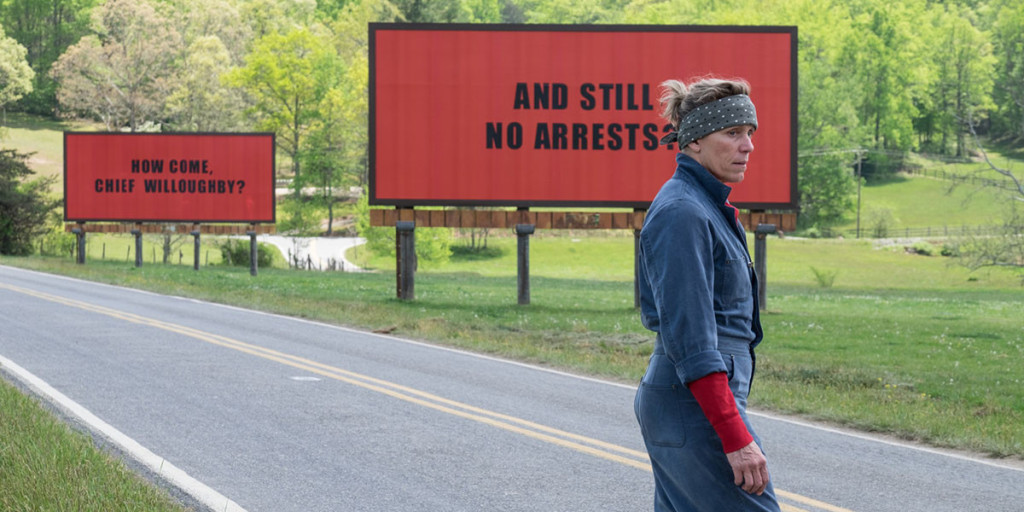
“Raped while dying,” the first billboard reads. The next, “And still no arrests,” and finally, “How come, Chief Willoughby?”
When asked why she addressed the town’s police chief by name in a public display of dissension, a desperate but not despondent Mildred Hayes (Frances McDormand) tells the reporter, “The buck’s gotta stop somewhere.”
Chief Willoughby (Woody Harrelson) is a respectful, gentle man who makes it clear to Mildred that in the seven months since her daughter’s murder the police have done everything in their power to try and find her rapist and murderer. And she’s a rational person, so she knows that. It’s not Chief Willoughby that Mildred is angry with. She’s angry at the situation that her daughter was raped and murdered and that the man who did it is on the loose. But anger at a situation has to be directed somewhere, to someone, specifically, because a situation can’t be punished. A situation can’t be prosecuted for rape and murder. A situation can’t be looked at in the eyes and be made to feel the pain of the victim’s loved ones.
Mildred’s billboards cause another situation: those in the town who were likely sympathetic to her plight now feel resentment towards her for placing blame on Chief Willoughby in such a brazen way. “The town knows what kind of man Mr. Willoughby is,” the town priest says. Her dentist tells her they’re all on Willoughby’s side, right before he almost extracts one of her teeth without Novocaine. Her billboards were erected as a last-ditch call to action, but the reason she did it was displaced hatred and frustration. Her billboards drew a line in the sand, and the people of Ebbing, Missouri now felt they were forced to choose a side, and finding her daughter’s rapist and murderer now becomes inconsequential.
And so Three Billboards does not continue to be a film about avenging a young girl’s death, but rather an exploration of what happens to a society when its citizens allow their reactionary nature to overwhelm their critical thinking capacities.
Of course, this all sounds familiar. However anyone may feel about the person currently holding the position of president of the United States, he was not put in that position because of his own merits or faults. He is merely the symptom of the displaced hatred and frustration of many of the voters in this country, and subsequently lots of lines have been drawn in sand.
Three Billboards was likely in production before the current presidential administration came into office, but it follows a string of television shows and movies from this year that ring so true to the current sociopolitical climate of this country that they feel prophetic. (The Handmaid’s Tale is a shining example of this.) This kind of entertainment happens to speak to a very specific cultural consciousness, in a way that makes them function as both catharsis and a warning.
Three Billboards is of its time but not because of its time, which ensures that it’s never too obvious or pandering. Rather, it confronts each viewer with their own reactionary tendencies. The brilliance of the film is that its characters are built in such a precise, complex way that it’s impossible to choose sides. The film tests your allegiances to characters, only to subvert the structure that causes us to choose sides in the first place.
The film has some continuity flaws that have the potential to distract from its ultimate goal, but it’s still a film that should be listened to. It’d be easy to say the Three Billboards’ message is that, as its sweetest and least controversial character said, “Anger begets greater anger.” But the film makes it clear that inner change is possible when people allow for greater complexity of thought. And that it’s possible for compassion to beget greater compassion, so long as everyone involved resists the urge to draw lines in sand.
